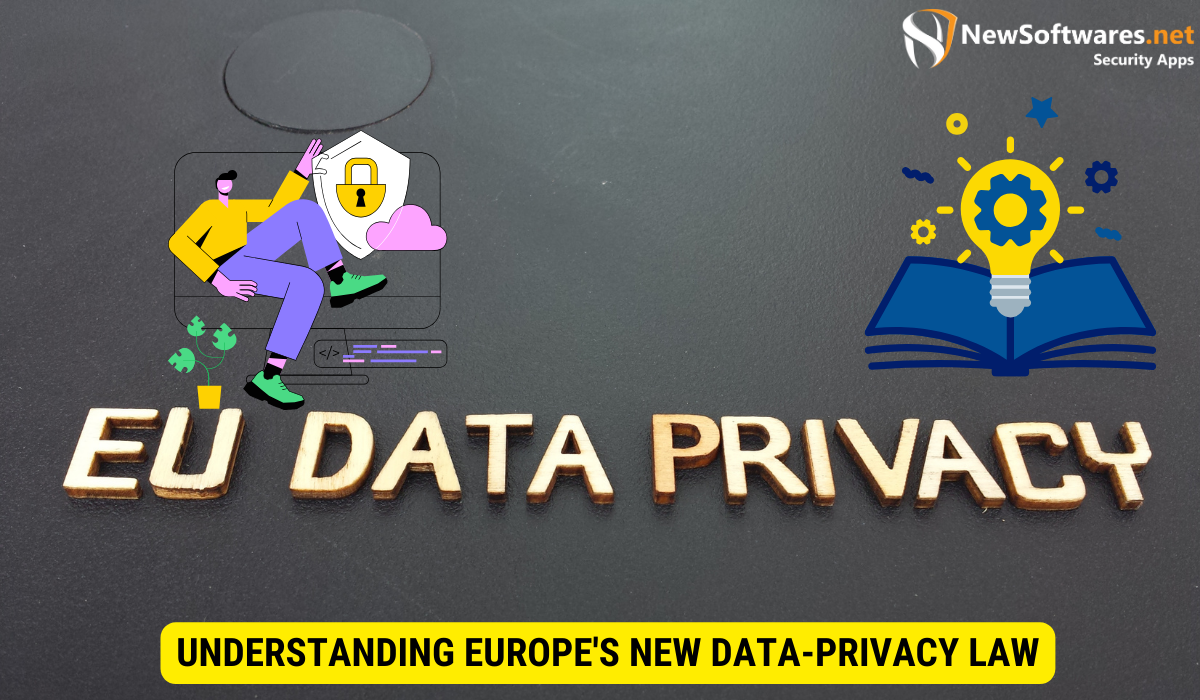The main losers from Europe’s new data-privacy law, the General Data Protection Regulation (GDPR), are likely to be tech giants and small and medium enterprises (SMEs) due to the stringent requirements and potential high costs of compliance.
Europe’s new data-privacy law, also known as the General Data Protection Regulation (GDPR), has been making waves in the business world. With its wide-ranging implications and strict regulations, many are wondering who will be the main loser in this new landscape. I will explore the basics of the GDPR, analyze the potential impact on various entities, discuss the global implications of the law, and speculate on the future of data privacy in Europe.
Understanding Europe’s New Data-Privacy Law

The General Data Protection Regulation (GDPR) was implemented on May 25, 2018, with the aim of protecting the personal data of individuals within the European Union. It replaces the outdated Data Protection Directive of 1995 and introduces stricter rules and regulations for organizations that collect and process personal data.
With the increasing digitalization of our lives, the need for stronger data protection measures has become evident. The GDPR is designed to address the challenges posed by the digital age and ensure that individuals have greater control over their personal information.
The Basics of the New Legislation
Under the GDPR, organizations must obtain explicit consent from individuals to collect their personal data. This means that they cannot simply assume consent or bury it in lengthy terms and conditions. Instead, they must clearly explain why they need the data and how it will be used.
Transparency is a key principle of the GDPR. Organizations are required to be open and honest about their data collection practices, providing individuals with clear information about what data is being collected, how it will be used, and who it will be shared with, if applicable.
In addition to obtaining consent, organizations must also provide individuals with the option to access, correct, and delete their data. This empowers individuals to take control of their personal information and ensures that organizations are held accountable for the data they collect.
Another important aspect of the GDPR is the concept of data minimization. Organizations are encouraged to collect and retain only the necessary personal data for specific purposes. This means that they should avoid collecting excessive or irrelevant information that is not directly related to the services they provide.
Furthermore, organizations must implement measures to ensure the security and confidentiality of the data they collect. This includes implementing technical and organizational measures to protect against unauthorized access, loss, or destruction of personal data.
Key Changes in Data Privacy Regulations
The GDPR introduces several key changes in data privacy regulations. One of the most significant changes is the increase in penalties for non-compliance. Organizations that fail to adhere to the GDPR can be fined up to €20 million or 4% of their annual global turnover, whichever is higher. This serves as a strong deterrent for organizations to take data protection seriously.
Additionally, the GDPR grants individuals more control over their personal data. They have the right to be informed about the collection and use of their data, the right to access their data, the right to rectify any inaccuracies, and the right to erasure (also known as the “right to be forgotten”). These rights empower individuals to have a say in how their personal information is handled and give them the ability to correct or remove their data if necessary.
Furthermore, the GDPR introduces the concept of the “data protection officer” (DPO). Organizations that process a large amount of personal data or engage in certain types of data processing activities are required to appoint a DPO to oversee data protection compliance. The DPO acts as an independent advisor, ensuring that the organization complies with the GDPR and handles personal data responsibly.
In conclusion, the GDPR represents a significant step forward in data protection. It strengthens individuals’ rights, increases accountability for organizations, and promotes transparency in data collection and processing practices. By putting individuals in control of their personal information, the GDPR aims to build trust and confidence in the digital economy.
Potential Losers in the New Data-Privacy Landscape
While the GDPR aims to enhance data protection and privacy for individuals, it also presents challenges for various entities operating within the EU. Let’s take a closer look at two potential losers in this new data-privacy landscape:
Impact on Tech Giants
Tech giants such as Google, Facebook, and Amazon rely heavily on collecting and analyzing vast amounts of user data to drive their business models. With the GDPR’s stringent regulations, these companies may face difficulties in obtaining explicit consent from users and ensuring compliance with the new requirements.
Additionally, the GDPR imposes limitations on the transfer of data to countries outside the EU that do not have adequate data protection regulations. This could impact the global operations of tech giants, as they may need to modify their data transfer mechanisms or face potential disruptions.
Consequences for Small and Medium Enterprises
Small and medium enterprises (SMEs) may also bear the brunt of the GDPR. These organizations often lack the necessary resources and expertise to navigate the complex requirements of the law. Compliance can be especially challenging for SMEs that rely on targeted marketing or data-driven strategies to compete in the market.
SMEs may need to allocate significant resources to implement data protection measures, update privacy policies, and train employees. Failure to comply with the GDPR could lead to hefty fines and reputational damage for these businesses.
The Global Implications of Europe’s Data-Privacy Law
The GDPR not only has implications within the European Union but also impacts businesses and individuals worldwide. Here are two significant global implications of the law:
Effects on International Business Operations
Many companies outside the EU process personal data of EU citizens, either through direct interactions or by offering goods and services to EU residents. In such cases, these companies must comply with the GDPR regardless of their physical location, which could result in a significant impact on their operations and compliance costs.
The GDPR’s extraterritorial scope has prompted organizations globally to reassess their data protection practices and ensure they are in line with the new requirements. This, in turn, may lead to a shift in global standards for data privacy and influence the development of similar legislation in other jurisdictions.
Influence on Global Data-Privacy Standards
The GDPR has set a high bar for data protection and privacy standards globally. Its principles of consent, transparency, and accountability have prompted countries outside the EU to reevaluate their own data protection regulations.
Several countries, including Brazil, Japan, and South Korea, have already introduced or updated their data protection laws to align with the GDPR. This indicates the growing influence of the GDPR on global data-privacy standards and sets a precedent for other regions to follow suit in enhancing their own data protection measures.
The Future of Data Privacy in Europe

The implementation of the GDPR marks a significant milestone in data protection and privacy. However, it is just the beginning of the journey towards better data privacy in Europe. Here are some predicted long-term outcomes and potential for further legislative changes:
Predicted Long-Term Outcomes
Over time, the GDPR is expected to lead to increased awareness and understanding of data privacy rights among individuals. This will empower individuals to exercise greater control over their personal data and hold organizations accountable for any violations.
The GDPR may also drive innovation in the development of privacy-enhancing technologies and services that help organizations comply with the law while still delivering personalized user experiences.
Potential for Further Legislative Changes
The GDPR is a dynamic piece of legislation that will continue to evolve as new technologies and data-driven practices emerge. As data privacy concerns persist, policymakers may introduce amendments or additional regulations to address emerging challenges.
Organizations should anticipate the possibility of future legislative changes and stay informed to ensure ongoing compliance with data-privacy laws.
Key Takeaways
- The GDPR is a comprehensive data-privacy law that aims to protect the personal data of individuals within the EU.
- The law introduces stricter regulations for organizations that collect and process personal data, and it grants individuals more control over their data.
- Tech giants and SMEs are among the potential losers in the new data-privacy landscape due to the challenges posed by GDPR compliance.
- The GDPR has global implications, affecting companies that process EU citizens’ data and influencing the development of data-privacy standards worldwide.
- The implementation of the GDPR is just the beginning, and the future of data privacy in Europe may involve predicted long-term outcomes and potential legislative changes.
FAQs
Who does the GDPR apply to?
The GDPR applies to organizations that process the personal data of individuals within the European Union, regardless of the organization’s location.
What are the penalties for non-compliance with the GDPR?
Organizations that fail to comply with the GDPR can face fines of up to €20 million or 4% of their annual global turnover, whichever is higher.
How does the GDPR affect individuals?
The GDPR grants individuals greater control over their personal data. They have the right to be informed, access their data, rectify inaccuracies, and request erasure of their data.
What is the extraterritorial scope of the GDPR?
The GDPR applies to organizations outside the EU if they process the personal data of EU citizens or offer goods and services to EU residents.
Will there be further changes to the GDPR in the future?
The GDPR is subject to future changes as new technologies and data-driven practices emerge. Organizations should stay informed to ensure ongoing compliance with data-privacy laws.
Conclusion
Europe’s GDPR brings significant changes to data privacy laws, impacting various entities. While it aims to protect individual data rights, its stringent and comprehensive nature poses challenges, particularly to tech giants and SMEs. Its global influence also prompts a rethinking of data privacy standards worldwide, indicating an ongoing evolution in data protection practices.
